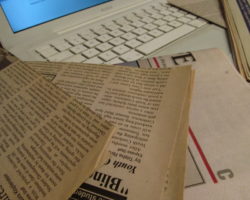
“…the meteor shower will hit atmosphere in three minutes. If you’re just tuning in, NASA, in conjunction with the military, succeeded in breaking up the oncoming asteroid mere seconds before the window of opportunity expired. Authorities still expect a few of the larger fragments to survive atmospheric entry….”
“SHUT THAT GARBAGE OFF!” Editor-in-Chief of The Daily Sentinel hurled a stapler at the TV news anchor, adding another crack to the spider-webbed screen. “NOW!”
Macaulay, the newest of the disposable interns, launched himself onto Patricia’s desk in an attempt to reach the off switch. The screen hung from the ceiling, inconveniently high; no one had seen the remote in three weeks. Macaulay slipped on the phone and tumbled headfirst off the desk, but his fingers managed to disrupt the ancient TV’s fragile state of being. It went blank.
Matt and Patricia help Macaulay extricate himself from the trash can and filing cabinet.
“I don’t hear anything!” Editor-in-Chief Rick Blackney fumed.
The crowded newsroom filled with the relentless battering of keyboards that was David’s harp to Blackney’s frustrated soul. Of course, one had to be careful. Last Thursday, Jon in advertising had pounded away with abandon, typing nonsense with flair. (Everyone typed nonsense when Rick was in one of his “Black-ney” moods; sense didn’t come quickly enough.) This time, however, Blackney noticed; Jon put in his notice.
“I’m sick and tired of those fame jockeys destroying our readership. Bloated opinions, fortune cookie sound bytes—I hate it. I loathe it. Shallow, pretty people for shallow, pretty pictures. What happened to news? Tell me that!”
They had all heard it before. Eddie, who had started as a delivery boy before most of the others had been delivered, kept a revered piece of office scripture in his desk: a tally of every rousing, ranting Blackney speech made over the last 25 years, with scrawled snippets of the best lines.
Blackney launched into the incentive phase: “First one to pitch me a new angle on the asteroid story gets a day off, paid. Write me a front-page spread, a bona fide award winner. Let’s kick these emptied-headed TV mannequins in the teeth so hard they have to eat Jello the rest of their lives. Give me a knock-out story!”
The typing slowed to the clickety-clack of a dozen trains passing each other.“Now! Get on the phone. Drive out to the site. Take pictures. Interview victims. Dig up dirt. Bradley, what’ve you got?”
Bradley was always a bit slow at this stage of the proceedings. “Ah…cost of repairs to the city, maybe tie it in with infrastructure investments and the lagging economy.”
“Awful! Horrendous! Patricia, something good.”
“How it feels through a child’s eyes. Wonder, fear, maybe tilt it a bit toward the apocalyptic.”
“Good luck with the quotes. Kids aren’t scared of nothin’ anymore, even if they’ve happened to look up from their 3DSPSP thingies long enough to realize an asteroid nearly crushed the planet. B2, tops.”
“Snapshots of ‘Where Were You When The Asteroid Struck.’”
“Shut up, Macaulay. Let the grown-ups do the talking. Go change toner cartridges or something. Matt?”
“Religious cults and the asteroid. Round up some of the weirdoes from downtown, maybe that church on Fifth.”
“Okay, perhaps. But the networks will have beat you to it and done it better. People love the bizarre, the sensational, but it won’t stick, not in print, not even on screen. It’s like the Thin Mints the Girl Scouts sell. You eat ten of them and don’t remember a thing and now you’re dying of heart disease. Twenty-four-hour news cycle, my—”
“Actually, I was thinking—”
But Blackney had reach stage three, which Patricia liked to call the “Independence Day.”
“We need to find something that’ll get in their head, people. Something local, something universal. It’s got to be tragic, but it has to leave them with a smile. It has to stick with them so they can’t forget, so they won’t ever forget. That’s a story. That’s what will put The Daily Sentinel on the map!”
It seemed that immediately after this final word, proclaimed with a boom, Blackney vanished. The typing ceased.
They noticed the hole in the ceiling first. It was large enough to climb through, and Human Resources peered down at them through it.
Blackney, or what was left of him, lay on the ground, smashed beneath a rock. It took some time to process. Bernard, the head photographer, snapped a few shots.
“Dibs!” Macaulay shouted. The others looked at him. “Dibs on the story. Dibs!”
“Nuts,” Patricia muttered.
Hahaha! I love it!
Thanks! I had fun writing it. Have you listened to the brainstorm this came from? (See Derailed Trains of Thought, ep. 24)
The brainstorm was in ep. 23, Nick. Ep. 24 is not out yet, but will be soon! 🙂
Yes, you’re right! I was getting ahead of myself. Thanks for the correction. That would be this podcast.